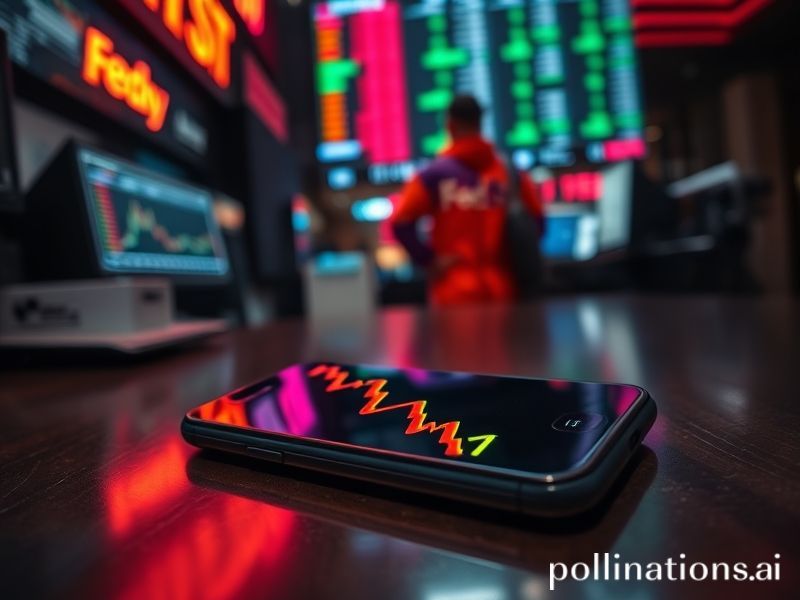FedEx Stock: Global Economy’s Purple Promise Delivers Mixed Results Worldwide
**FedEx Stock: When Your Package Arrives Late but Your Portfolio Gets There Early**
The global economy’s favorite anxiety barometer—FedEx stock—has been performing its usual interpretive dance lately, leaving international investors to decode whether we’re witnessing a recovery or just another cargo cult ritual. From Shanghai to São Paulo, the purple-and-orange empire that once promised to connect the world now serves as our collective economic mood ring, changing colors with every quarterly confession.
International observers note the delicious irony: a company built on “when it absolutely, positively has to be there overnight” now can’t seem to deliver consistent returns with similar urgency. The stock’s recent volatility has become something of a geopolitical tea leaves reading session, with analysts in London, Mumbai, and Tokyo all squinting at the same data and arriving at conclusions as different as British and American breakfast sausages.
The developing world watches with particular fascination as FedEx’s fortunes mirror their own complicated relationship with globalization. African entrepreneurs track the stock while waiting for packages that may or may not clear customs by the next fiscal year. Latin American business owners have developed an entire philosophy around FedEx’s “estimated delivery windows”—mainly that time is a social construct invented by wealthy nations to make the rest of us feel inadequate.
In Europe, where national postal services still operate with the efficiency of Victorian bureaucracy, FedEx represents both American ambition and American overreach. The continent’s investors buy shares with the same mixed feelings they have about Netflix subscriptions—grudging appreciation for convenience tempered by cultural superiority about how things used to be so much more authentic when you had to wait six weeks for anything to arrive from another country.
The Asian perspective adds another layer of cosmic irony. Countries that essentially manufacture everything the West orders online watch FedEx struggle with the mathematical impossibility of delivering infinite packages with finite resources. Chinese investors particularly enjoy the spectacle of American logistics companies discovering what they’ve known for decades: building infrastructure is expensive, maintaining it is painful, and explaining delivery delays to angry customers is a special circle of hell.
Middle Eastern sovereign wealth funds have taken a characteristically philosophical approach, treating FedEx stock as performance art about humanity’s eternal struggle against the laws of physics and reasonable expectations. They’ve been accumulating shares with the patience of people who’ve watched civilizations rise and fall, understanding that today’s supply chain crisis is tomorrow’s historical footnote.
The real international significance lies deeper than quarterly earnings. FedEx has become our global economy’s confession booth, where we collectively admit that maybe—just maybe—we’ve created a monster by expecting everything to arrive yesterday at rock-bottom prices while paying workers a pittance and pretending fuel grows on trees. Each earnings call serves as group therapy for capitalism’s cognitive dissonance.
What makes this particularly entertaining for the international audience is watching American analysts discover what the rest of the world has always known: geography matters, labor costs can’t be compressed indefinitely, and “just-in-time” inventory works wonderfully until it absolutely doesn’t. The stock price becomes a running joke about developed nations learning basic economics in real-time, with global investors placing bets on how many quarters it takes before reality delivers its own special package—one that requires a signature and can’t be left with neighbors.
As we watch FedEx navigate between shareholder expectations and physical reality, the international community nods knowingly. We’ve seen this movie before, just with different actors and subtitles. The plot remains comfortingly predictable: promise the impossible, deliver something slightly disappointing, then act surprised when gravity applies to quarterly projections too.







